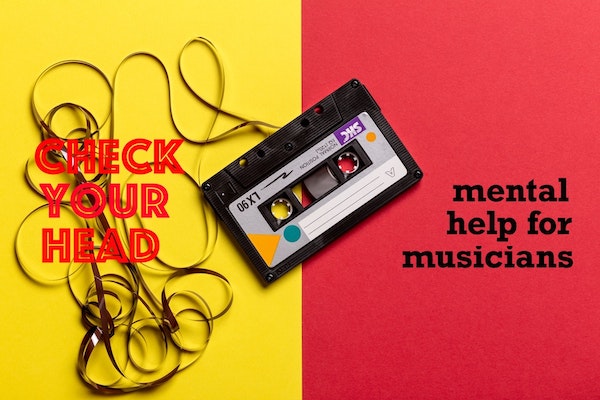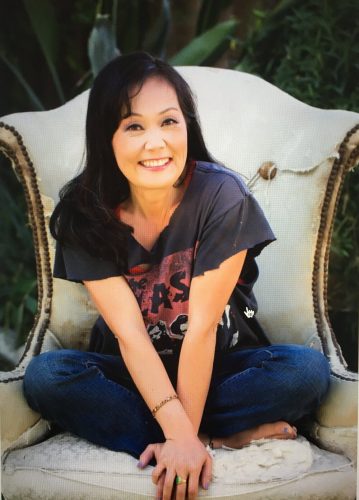Podcast Review: “CHECK YOUR HEAD: Mental Help for Musicians”
By Steve Provizer
It is vital to take into account the pivotal role that money, politics, and racism play in the availability and efficacy of mental health services.

Launched in 2019, the podcast CHECK YOUR HEAD: Mental Help for Musicians was created by and is produced and hosted by Mari Fong, a music journalist and Life Coach for Musicians. She was alarmed by the growing number of suicides as well as other mental health issues bedeviling the music industry. Fong raised funds for the project by hosting music events and partnering with charities. The helpful podcast website contains links to a variety of mental health resources for musicians and non-musicians.
The podcasts, which range from 40-113 minutes, feature an interview by Fong with a musician followed by a conversation with a mental health expert. Most of the musicians have been drawn from the indie and rock scene and include: Gilby Clarke (Guns N’ Roses), Fred Armisen (Portlandia, SNL), Frank Zummo (SUM 41) Emilio Castillo (Tower Of Power), Yesod Williams (Pepper), Sammi Doll (IAMX, Kat Von D), Danny Griego and Shaun Morgan (Seether), Kevin Lyman (Vans Warped Tour), India Shawn, Mackenzie Nicole. No jazz or classical musicians, and few of color.
The mental health experts include: Dr. Dan Reidenberg (SAVE.org), Michael Friedman, Ph.D. (Psychology Today), Dr. Ish Major (Relationship expert, “Marriage Boot Camp”), Johan Svanberg (Record Union, “The 73 Percent Report”) and Tim Ringgold, MT-BC (Music Therapist, author of Sonic Recovery: Harness the Power of Music to Stay Sober).
Fong is an inveterately upbeat host. Would a person in extremis be comfortable with her interviewing style? I can see where, depending on your mood, it might either provide comfort or come off as cloying. That said, she is well prepared and reacts quickly to her interviewees with questions designed to keep things moving.
The musicians featured in the two podcasts I heard were Linda Ronstadt and Emilio Castillo (Tower of Power). In the case of the Ronstadt interview, it was a challenge for Fong to maintain an upbeat pace. Fong asks questions designed to provoke difficult, possibly emotionally wrenching answers. But Ronstadt would have none of it; she doesn’t seem to see life as difficult or emotionally wrenching. It must have been tough and lonely to be on the road, asks Fong. No, there was a lot of camaraderie… It must have been tough to be a strong-willed female in a male dominated industry. Not particularly — I had a good manager… Do you have performance anxiety, especially in large venues? Not really. I just didn’t like the big arenas cause they didn’t sound very good… How would you suggest artists deal with debilitating insecurity? Just go back to the work and do the best you can… Ronstadt is more open about her return to her Mexican roots, racism, and her disgust at separating children from their families at the border. In the end, I think “suck it up” is a fair description of the advice someone listening to this interview would come away with.
The second half of the podcast is an interview with Dr. Ish Major (“Psychiatrist, Relationship Expert, ‘Marriage Boot Camp’”). Dr. Major draws on a folksy, down-to-earth approach, using understandable metaphors like cars, television, etc. Call it common sense spiced up with psychological perspective: We pick the love we deserve. What’s my love-ability, my likeability? What are the non-negotiables? Become your own best company. Reasonable pieces of advice, possibly pertinent to someone seeking support.

CHECK YOUR HEAD host Mari Fong. Photo: Facebook.
The second podcast I listened to was with Castillo, from the band “Tower of Power.” His interview focuses on how he escaped an addiction to drugs and alcohol. Castillo is a firm believer in the 12-step program: God did it — I just showed up. In the process he became aware of traumatic abandonment issues and came to terms with his addictive personality. Still, it was hard for me to tell just how much self-awareness Castillo had attained. He does not see himself as preaching any self-help gospel, just someone sharing his story. Anyone in a similar life situation would find that his experience of recovery rings true.
Part two of the podcast is with Tim Ringgold, MT-BC (“Music Therapist, author of Sonic Recovery: Harness the Power of Music to Stay Sober). Like Castillo, Ringgold became sober through a 12-step program. He describes being talked out of jumping off a bridge by a sobriety brother who presented him with alternate futures, scenarios that overshadowed the self-soothing choice of suicide. Ringgold talks about the need to deal with the elemental existential question: Am I alone? His description of using percussion instruments during music therapy sessions is interesting and persuasive.
There are a fair number of mental health-oriented podcasts out there, but a dearth of statistics detailing programs that are not in the top tier of listenership (comedy, news, true crime, sports, etc.). So it is impossible to know how large the audience is for this kind of show. And that is crucial information — do podcasts like this reach those most in need of hearing them?
Podcasting has reached maturity, although I don’t think anyone really knows if the technology and its programming will permeate the culture the way radio used to. Will podcasts take on the metaphorical “hearthside” value that broadcasting once had? Will people who are confronting traumatic problems turn to podcasts to find viable solutions?
In writing this, I tried to put myself in the position of someone who wanted real help — not entertainment or diversion. If I were in that position, I would seek out personal, professional help before turning to a mass medium. Of course, as a middle class person, long exposed to therapy, this is a path I’m familiar with and can navigate easily. Others, who might not have access to individualized mental health treatment, might seek other alternatives. The catch is that podcasting is, to some extent, an elitist medium: you have to own the necessary technology and have the expertise to access programming. This may be less of a problem for many musicians, who need to be tech-savvy for their work.
I salute and appreciate the valuable efforts of podcasts such as CHECK YOUR HEAD. They may be heard by the right person at the right time and help alleviate suffering. However, producers should be encouraged to consider just where their podcast fits in the spectrum of current strategies tasked with providing mental health treatment. For example, there is a vital new call to serve the needs of a more diverse, underserved population. In order to deliver effective therapeutic services, any putative mental health approach must take into account the pivotal role that money, politics, and racism play in this population. A commitment to understanding who your audience can and should be will broaden and deepen the content of your programs and websites, influence your outreach, and perhaps even determine your choice of media platform.
Steve Provizer writes on a range of subjects, most often the arts. He is a musician and blogs about jazz here.
Tagged: Check Your Head, CHECK YOUR HEAD: Mental Help for Musicians, Mari Fong
